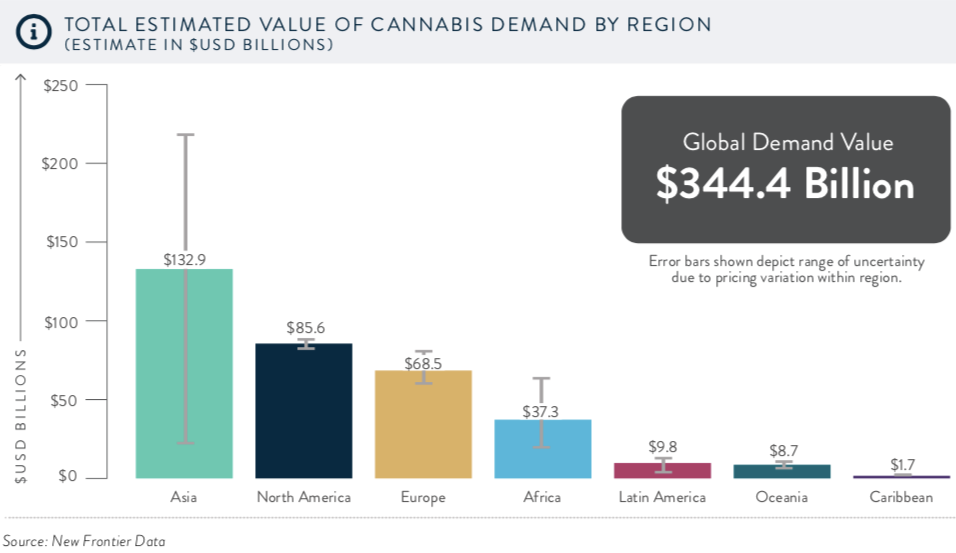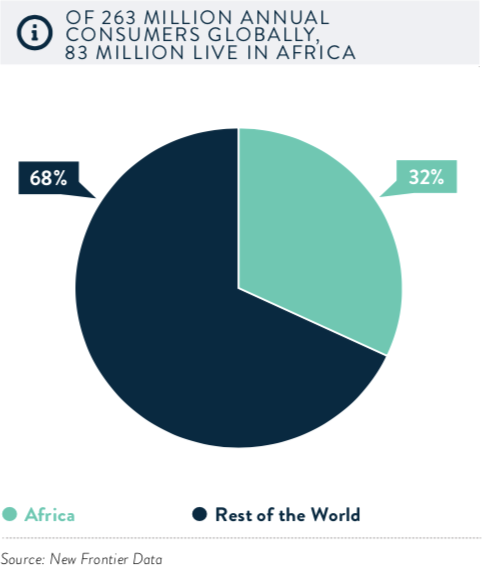While Africa’s growth potential is well known among emerging markets investors, fewer realize the continent’s potential for cannabis cultivation. In 2018, South Africa became only the third country in the world to legalize the growth and use of cannabis, and with many already having a long history with the plant, other African nations could be poised to follow suit.
That is at least the perspective of a new research report published by cannabis research firm New Frontier Data. The “Africa Hemp & Cannabis 2019 Industry Outlook” examines the opportunities, headwinds and relevant statistics underlying potential cannabis industries developing in some of the continents largest economies.
Here are four of the biggest insights from the report.
Africa Is The World’s Fourth Largest Cannabis Market
Despite being illegal throughout much of the continent, Africa’s cannabis market is estimated to be worth $37.3 billion. According to projections from New Frontier Data, the global legal and illegal cannabis market in 2019 has an estimated value of $344.4 billion, with Asia, North America, and Europe representing more than 83 percent of that figure.
This means that Africa’s current demand for cannabis represents about 11 percent of the total global market. Africa beat out other emerging markets in Latin America and Oceania, which together only make up about 5 percent of the global market.
Annual Cannabis Use In Africa Is Nearly Double The Global Average
On a related note, the average rate of cannabis use among adults in Africa is far above that of most other markets.
According to the report, “Cannabis has been used in Africa for centuries for medical, ritualistic, and social purposes, and its use remains common. The average annual cannabis use rate in Africa is 11.4 percent — nearly double the global average rate of 6 percent, with use in some markets running even higher, as in Nigeria, where prevalence of annual use is 19 percent among adults.”
The report estimates that, of the roughly 263 million people globally who use cannabis at least once a year, nearly a third live (83 million) live in Africa.
South Africa Courts Ruled For The Right To Grow And Use Cannabis, But Not To Sell It
While South Africa is the third country to allow the use and cultivation of Cannabis, it is among only one other country, Georgia, that paved the way for legal use through judicial rather than legislative action.
Because of this, South Africa, like Georgia, has some restrictions about the legality of the plant. Georgia, for instance, does not allow for cultivation or sale of the plant, only possession and consumption. While South Africa does permit cultivation, sale remains illegal for the time being.
This may change as “the nation’s laws are currently being revised to account for the court’s ruling,” the report says. “The country's first medical cultivation license was issued in early April 2019.”
Foreign Investment Is Trying To Find A Footing, But It’s Not All Welcome
Give the massive market for cannabis that many African nations represent, it’s not surprising to learn that there is already massive international investment in countries that currently allow cultivation.
The report highlights one of the larger investments in Lesotho, a country enclaved by South Africa that allows cultivation. Per the report:
In 2018, Canada-based Supreme Cannabis invested $10 million CAD ($7.48 million USD, 103.5 million ZAR) in Medigrow Lesotho. The deal was followed by Canopy Growth Corporation (the world’s largest cannabis company with a market cap of over $14 billion) acquiring Lesotho’s Daddygrow, a licensed cannabis producer, for $28.8 million. The deals illustrate the scale of investment that the cannabis industry can attract, and underscores how these deals are already happening in markets which have been most progressive with their cannabis laws.
However, the report also points to other unsanctioned foreign investments in the country that take advantage of a particular country’s governmental or economic instability to establish itself. Instances of unsanctioned or unclear licensing led to “strong disagreements” within Uganda’s governing body, leading the First Lady and Minister of Education and Sports Janet Museveni to describe cannabis’ potential decriminalization as “satanic.”
The full report can be found here.
© 2025 Benzinga.com. Benzinga does not provide investment advice. All rights reserved.
Trade confidently with insights and alerts from analyst ratings, free reports and breaking news that affects the stocks you care about.
Cannabis is evolving – don’t get left behind!
Curious about what’s next for the industry and how to leverage California’s unique market?
Join top executives, policymakers, and investors at the Benzinga Cannabis Market Spotlight in Anaheim, CA, at the House of Blues on November 12. Dive deep into the latest strategies, investment trends, and brand insights that are shaping the future of cannabis!
Get your tickets now to secure your spot and avoid last-minute price hikes.

